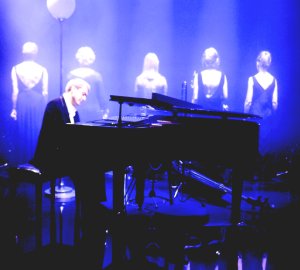Musical theatre – The forgotten artform

Musical theatre suffers from snobbery and prejudice but continues to capture new audiences. Joanne Benjamin sings the praises of the musical.

Musical theatre is the Cinderella of all artforms. There are many in the arts who deride it, defining it as commercial and therefore not artistically relevant and not in the same class as, for instance, straight drama, art or poetry. When I was appointed, in 2000, to set up and be the first Chief Executive of the International Festival of Musical Theatre I was asked to define the artform. A difficult task. How broad or narrow should we be? After much deliberation, the Festival defined musical theatre as anything in which music is used in a dramatic live performance ? thus including in our remit opera, ballet, pantomime, jazz and cabaret, as well as mainstream musical theatre.
Active inclusion
Musical theatre has a central place in the cultural life not only of Britain, but also of many other countries: Australia, South Africa, many European countries and, of course, the United States. How many of us had our first theatrical experience at a pantomime? How many of us took part in school shows, or university revues? Nearly everyone has had some exposure to music, or music-related theatre at some time in his or her childhood. And contrary to what we may be told, the Americans did not invent musical theatre ? it had its origins in Europe many, many years before it was ever conceived in the United States!
All of us involved in running the Festival have been overwhelmed by the number of schools and youth groups that do musicals ? and even more overwhelmed by the effect this has on the children and teachers that take part. We have seen pupils on the point of exclusion take part in shows and become changed personalities, who go on to further training and further success. We have seen work with disabled and disadvantaged youngsters who have found self-esteem and abilities in areas outside academia, and become enabled, as one participant put it to me, to ?do things everyone else does? from which they had been previously excluded. Amateur performances of musical theatre works by both adult and school groups have increased and continue to increase each year. In an age when the competition for our time is so keen, and technology is turning us into a more passive society, it is encouraging to realise that an impressive and growing sector of the population is using its leisure time in this way. In our stress-ridden society, the therapeutic value of this active participation needs to be emphasised.
Development
The commercial aspects of musical theatre have been discussed at great length. We know that musical theatre contributes a considerable sum to the UK economy (as it does in the US) from the VAT on theatre tickets and the National Insurance paid by workers in that sector. We know that as an artform it appeals to tourists ? transcending, as it does, language barriers ? and that the additional spend by these visitors also adds to the UK economy. However, until recently, no public funding went back into the development of the artform.
Arts Council England has recently started to make amends in this direction but not before the demise of the Bridewell Theatre, which had done so much to further the production of new works in the genre. The developmental process of new work from the page to the stage is a long process, and needs more support in the interim stages between the initial workshop and the fully staged production. Real benefit could be achieved from providing funding for regional venues to help develop new works in studio theatres, so that producers could have the opportunity to work with writers and creative teams in a protected environment to rewrite and polish work before it is produced in a full-scale production. Maybe the Arts Councils of the UK could look at ring-fencing some monies for the regional theatres to join with commercial producers in forming a recognised developmental programme for new musical writing?
New work or revivals?
The perennial question for a producer must be ?Do you go with a tried and tested product, or take a gamble on the new work?? There have been examples of successes and failures in both areas of late ? ?Billy Elliott? and ?Guys and Dolls? being notable West End successes while ?Calamity Jane? and ?The Far Pavilions? were less so. I view both as being of equal importance in the theatre world. It is vital that good revivals of the standard repertoire continue to be produced, so that new musical theatre writers can see the successes of the past and learn from the masters of the twentieth century. Public funding supports productions of Shakespeare and Ibsen, exhibitions of Constable and Vermeer, and performances of Mozart and Puccini, so why should it not provide support for productions of Gershwin, Rodgers and Porter shows. In all these different artforms the new protagonists in each genre are learning from the masters of the past. The National Theatre and English National Opera have both strayed into the musical theatre genre with varying degrees of artistic success but with considerable commercial success, the National Theatre tackling both revivals and new work.
Musicals do not, however, have to be huge, multi-million pound productions. Some of the most successful have been done on a much smaller and even minimalist scale. Much of the new writing, especially that of the newer American breed, for example, Adam Guettel, Jason Robert Brown and William Finn, are written for the smaller, off-Broadway sized spaces. They acknowledge that neither the producers nor the audience can afford only the major multimillion-pound shows, and there is an equal audience for the smaller musical.
It is art
Musical theatre is the one artform that provides something for everyone. We should not dismiss it as ?a bit of fluff? but view it as an artform to be respected and nurtured. Artistic integrity and commercial success are not mutually exclusive. Musical theatre provides many different styles of performance, for many different types and age ranges of audience and is the artform that truly addresses a serious subject in a form that will linger in the audience?s mind, provoking discussion or sending them out of a theatre tapping down the street. The press repeatedly tells us that musical theatre is dead, but it continues to rise from the ashes like a phoenix. I am sure it will continue to be at the centre of our cultural life for many years to come. And rightly so.
Joanne Benjamin is Chief Executive of the Cardiff International Festival of Musical Theatre, a biennial festival that, over a period of three weeks, celebrates the whole range of musical theatre old and new, large and small.
t: 029 2034 6999
w: http://www.cardiffmusicals.com

Join the Discussion
You must be logged in to post a comment.